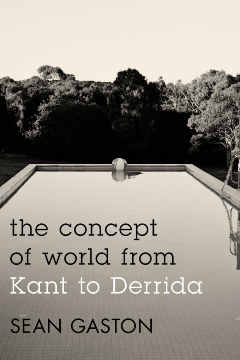
Additional Information
Book Details
Abstract
In the mid-eighteenth century metaphysics was broadly understood as the study of three areas of philosophical thought: theology, psychology and cosmology. This book examines the fortunes of the third of these formidable metaphysical concepts, the world.
Sean Gaston provides a clear and concise account of the concept of world from the mid-eighteenth century to the end of the twentieth century, exploring its possibilities and limitations and engaging with current issues in politics and ecology. He focuses on the work of five principal thinkers: Kant, Hegel, Husserl, Heidegger and Derrida, all of whom attempt to establish new grounds for seeing the world as a whole. Gaston presents a critique of the self-evident use of the concept of world in philosophy and asks whether one can move beyond the need for a world-like vantage point to maintain a concept of world. From Kant to the present day this concept has been a problem for philosophy and it remains to be seen if we need a new Copernican revolution when it comes to the concept of world.
Gaston (English & philosophy, Brunel Univ., UK; The Impossible Mourning of Jacques Derrida) examines how certain prominent 19th- and 20th-century Western and continental philosophers—Immanuel Kant, Georg Wilhelm Friedrich Hegel, Edmund Husserl, Martin Heidegger, and Jacques Derrida—dealt with the concept of world. In particular, Gaston is concerned with what he explains as the “need to establish an essential difference between what is merely in the world” and a wider viewing of “the world as a whole.” Beginning with Kant’s transcendental idea of the world and ending with Derrida’s theory of the world as a necessary fiction, Gaston does a fantastic job of using each philosopher’s writings and his own final chapter on contemporary philosophical problems to show how the concept of world is still problematic: we can’t become immersed in the world and simultaneously transcend it to create a unified whole. VERDICT While the work isn’t meant to be an introduction to each philosopher’s theories, its writing is clear and easy to follow so that it will appeal to both readers who are new to philosophy and also to scholars with an interest in continental philosophy.
Sean Gaston is Reader in English and the History of Philosophy at Brunel University, UK. His previous publications include Derrida and Disinterest (Continuum, 2005), The Impossible Mourning of Derrida (Continuum, 2006), Starting with Derrida (Continuum, 2007) and Derrida, Literature and War (Continuum, 2009).
One of the greatest strengths of the book is the engagement with Derrida’s newly published series of seminars and lectures ... it should be read by anyone interested in the way that the concept of world has been interpreted in Continental philosophy.
